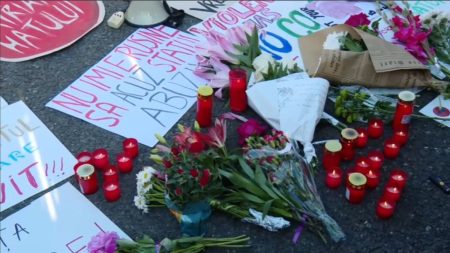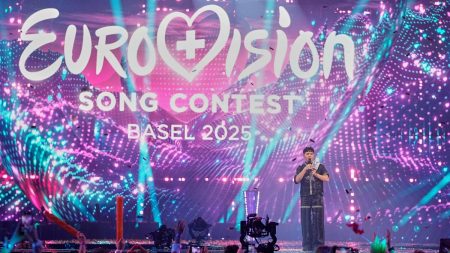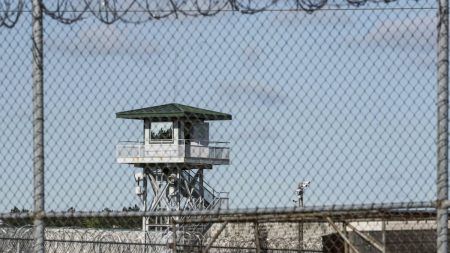The Romanian political landscape was thrown into disarray on Sunday, Constitution Day, following an unprecedented decision by the Constitutional Court to annul the first round of the presidential election. Călin Georgescu, the far-right candidate who had unexpectedly emerged as the frontrunner, stood in defiant protest outside a closed polling station, decrying the court’s decision as an assault on democracy. He argued that the annulment, justified by the court on the basis of alleged foreign interference and digital manipulation, effectively silenced the voice of the people and undermined the very foundation of Romanian freedom. The court’s ruling cited the illegal use of digital technologies, including artificial intelligence, and undeclared funding sources, suggesting a candidate, implicitly Georgescu, received preferential treatment on social media, thereby distorting the electorate’s will. This dramatic turn of events sparked outrage and accusations of political maneuvering, casting a long shadow over the future of Romanian democracy.
Georgescu’s meteoric rise to the top of the polls in the first round had already raised eyebrows and prompted widespread speculation. His success defied most pre-election surveys, which had consistently placed him significantly behind other candidates. The unexpected outcome fueled suspicions of external interference and manipulation, particularly given his substantial presence on social media platforms like TikTok. Georgescu had amassed millions of likes and hundreds of thousands of followers on the platform, leading some to dub him the “TikTok Messiah.” However, experts raised concerns about the authenticity of his online support, suggesting artificial inflation of his following. These suspicions were further bolstered by allegations from Romania’s top security body that Georgescu received preferential treatment from TikTok, potentially giving him an unfair advantage over his rivals.
The Constitutional Court’s decision to annul the election, based on allegations of Russian interference through a sophisticated social media campaign promoting Georgescu, further intensified the controversy. The court pointed to a trove of declassified intelligence detailing Russia’s alleged involvement in promoting Georgescu’s candidacy, citing concerns about the integrity of the electoral process. This revelation added fuel to the already simmering debate about the influence of foreign powers in Romanian politics and the vulnerability of democratic institutions to external manipulation. The annulment of the election results threw the country into a state of political uncertainty, prompting calls for transparency and accountability, and raising questions about the future direction of Romanian democracy.
President Klaus Iohannis, in a statement marking Constitution Day, emphasized the profound responsibility towards the nation’s values and the importance of upholding the Constitution as a shield against threats to democracy. He urged state institutions to act with prudence and respect for the rule of law amid the unfolding crisis. However, his words were met with criticism from political opponents, including George Simion, the leader of the far-right Alliance for the Unity of Romanians. Simion accused Iohannis of hypocrisy, arguing that the annulment of the election was itself an attack on democracy and a violation of the very Constitution Iohannis claimed to uphold. This further polarized the political landscape and intensified the ongoing power struggle between different factions.
Elena Lasconi, the reformist candidate from the Save Romania Union party who was scheduled to face Georgescu in the runoff, also vehemently condemned the court’s decision. She argued that the annulment was not only illegal and immoral but also a fundamental assault on the principles of democracy. Lasconi maintained that the second round should have proceeded as planned, allowing the electorate to exercise their right to choose their leader. Her condemnation further amplified the chorus of voices criticizing the court’s intervention and the perceived undermining of democratic processes. The cancellation of the runoff left the Romanian presidency in limbo and created a vacuum of power that further exacerbated the political tensions.
The annulment of the first round of the Romanian presidential election and the allegations of foreign interference have created a complex and volatile political situation. The accusations against Georgescu, his unexpected rise to prominence, and the subsequent court decision have raised fundamental questions about the integrity of the electoral process and the influence of social media in shaping public opinion. The ongoing debate highlights the fragility of democratic institutions and the challenges faced by nations navigating the complexities of the digital age. The rerun of the presidential vote, with its yet-to-be-determined date, will undoubtedly be closely scrutinized by both domestic and international observers, as Romania grapples with the fallout from this unprecedented electoral crisis. The outcome of the rerun will have significant implications for the future direction of the country and its place on the global stage.










